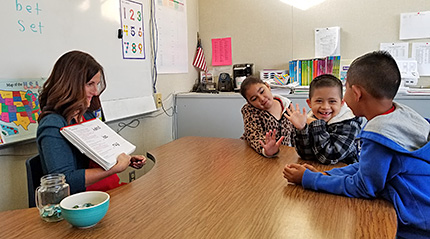 The Mild/Moderate Program provides instructional support services to students with mild to moderate disabilities. The Tulare County Office of Education provides these services to the 27 small, direct-service school districts in Tulare County, along with two TCOE charter schools and the county's court/community school sites. These instructional services are designed to support students with disabilities who are having difficulty with the general education curriculum in the areas of reading, writing, and mathematics. Services are provided in the general education classroom ("push in" model) or in a separate classroom ("pull out" model) individually or in small groups, depending on the needs outlined in each student's Individualized Education Program (IEP).
The Mild/Moderate Program provides instructional support services to students with mild to moderate disabilities. The Tulare County Office of Education provides these services to the 27 small, direct-service school districts in Tulare County, along with two TCOE charter schools and the county's court/community school sites. These instructional services are designed to support students with disabilities who are having difficulty with the general education curriculum in the areas of reading, writing, and mathematics. Services are provided in the general education classroom ("push in" model) or in a separate classroom ("pull out" model) individually or in small groups, depending on the needs outlined in each student's Individualized Education Program (IEP).
Who qualifies?
A student aged 3 to 21 who is experiencing learning problems may be found eligible for special education services if (1) the student is assessed and determined to have a disability, and (2) their educational needs cannot be met solely within the general education setting.
How are students referred?
Parents who have concerns about their child's educational progress should contact their child's teacher, the school's education specialist, or the site administrator to discuss their concerns. They may also request a Student Study Team (SST) meeting, which brings together all those who work with the student in order to discuss concerns and generate solutions. General education interventions may be put into place or, if warranted, the student may be referred for a special education assessment. Referrals can come from parents or from others involved with the student, such as teachers or other school personnel.
What else do I need to know?
The goal of the Mild/Moderate Program is to help students overcome or adapt to their specific disabilities both in the classroom and in daily life. Education specialists work in general education classrooms as much as appropriate. This has several advantages: 1) it provides opportunities to adapt or modify the regular classroom instruction to better meet the specific needs of the students; 2) it provides opportunities for general education and special education staff to work collaboratively to meet the needs of students; 3) it provides opportunities for struggling, non-special education students to receive additional assistance.
Jennifer Reimer, Administrator
(559) 730-2910, ext. 5141
jennifer.reimer@tcoe.org